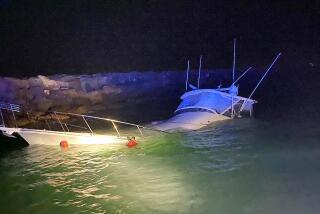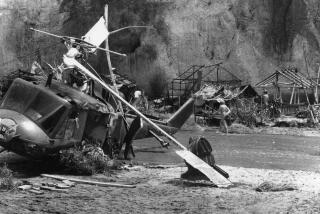Countywide : Conviction Upheld in Fatal Boat Crash
- Share via
An appellate court on Monday upheld the involuntary manslaughter conviction of Virl Earles, the boat driver who crashed into a concrete buoy in Anaheim Bay six years ago, killing five of his eight passengers.
Earles, now 34, has been free from custody during his appeal. He will now be ordered to return to court to begin the three-year sentence handed him by Superior Court Judge Jean H. Rheinheimer.
Justice Thomas F. Crosby Jr. of the 4th District Court of Appeal, who wrote the unanimous decision made public Friday, noted that none of the passengers aboard the Whiskey Runner were wearing life jackets, which should have caused Earles to be particularly cautious.
“The vulnerability of his passengers reflected poorly on his decision to travel at such a high speed in a dark harbor,” Crosby wrote.
Crosby added that Earles drove the boat “far too fast” and showed “an indifference to the consequences.”
Earles and several friends had been drinking at a restaurant at Peter’s Landing near Seal Beach on Oct. 28, 1984. They were joined by several others, and the group--nine in all--decided to travel by boat just after midnight to view the Queen Mary in Long Beach.
On the return trip, Earles re-entered Anaheim Bay at a high rate of speed. Misjudging the location of the safe-boating channel, he rammed the 20-foot craft into a concrete mooring buoy. Earles and three others were injured. Two in the group died of injuries received when thrown into the buoy. Three others drowned.
Earles, a part-time boat worker from Westminster, testified at two trials that a missing marker light in the bay caused him to stray off course. Later, a federal judge ordered the U.S. Navy to pay a total of $2.3 million to the families of the victims on the grounds that it should have had better markers in the channel. But that finding did not exonerate Earles.
A first jury was hung 9 to 3 in favor of acquitting him. But he was found guilty by a new jury in a second trial.
Prosecutors alleged that Earles was grossly negligent on numerous grounds: He had been drinking and would have been legally drunk if driving a car instead of a boat; he drove between 25 and 30 m.p.h. when the posted speed limit in the bay was 5 m.p.h., and the boat was overloaded and did not have an adequate number of life jackets.
More to Read
Sign up for Essential California
The most important California stories and recommendations in your inbox every morning.
You may occasionally receive promotional content from the Los Angeles Times.













